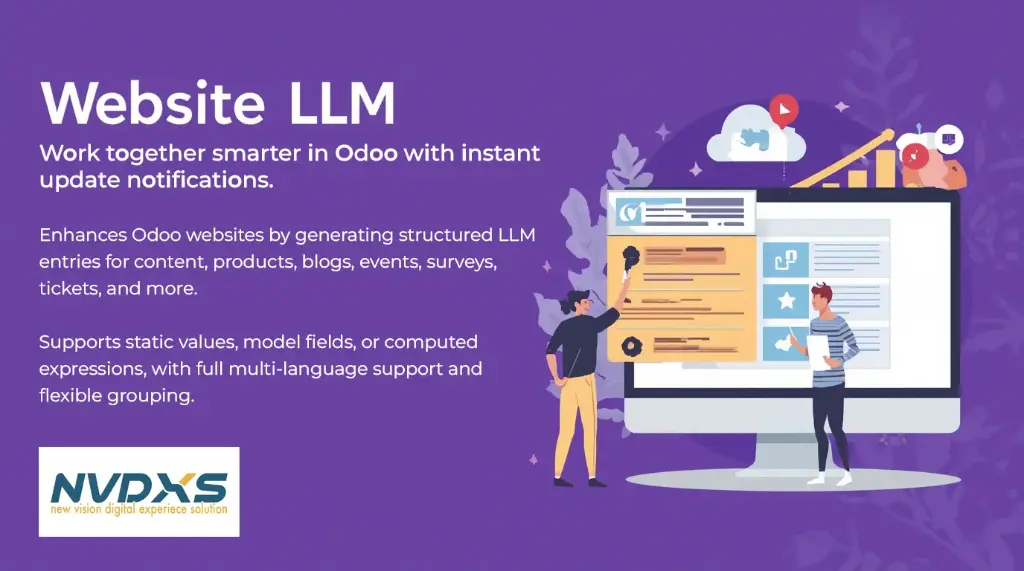
Website llm
https://nvdxs.com/shop/odoo-website-llmhttps://nvdxs.com/web/image/product.template/2306/image_1920?unique=0faab6a2 sold in last 72 hours
Terms and Conditions
30-day money-back guarantee
Shipping: 2-3 Business Days
Website LLM (SEO Optimized)
Boost your Odoo website’s visibility with Website LLM, a module that automatically generates structured, SEO-friendly content for large language models (LLMs) and AI systems. Transform your website into an AI-ready knowledge source while improving discoverability and multilingual support.
- Automatic LLM Entries: Generate structured entries for products, blogs, events, surveys, and more, formatted for llms.txt and llm-full.txt.
- SEO-Optimized Content: Enhance titles and descriptions with built-in AI optimization for clarity, relevance, and keyword performance.
- Multi-Language Support: Export content in all enabled website languages, making your site accessible to global AI systems and users.
- Dynamic Updates: Automatically create or refresh entries when content changes, ensuring your exports are always up to date.
- Grouping & Sections: Organize entries by categories, menus, or custom rules for structured and easy-to-parse files.
- Seamless Website Integration: Works with Odoo’s standard models, no extra development needed.
With Website LLM, your Odoo website is not only user-friendly but also machine-friendly—helping search engines, AI tools, and language models better understand and promote your content.

Automatic LLM Entries
Instantly generate structured entries for all your website content—products, blogs, events, and more—formatted for llms.txt and llm-full.txt
Multi-Language Ready
Export optimized content in all your website’s languages, making your site accessible to global visitors and AI systems alike
Smart Grouping & Sections
Organize entries by categories, menus, or custom rules, ensuring clarity and easy parsing by AI models.
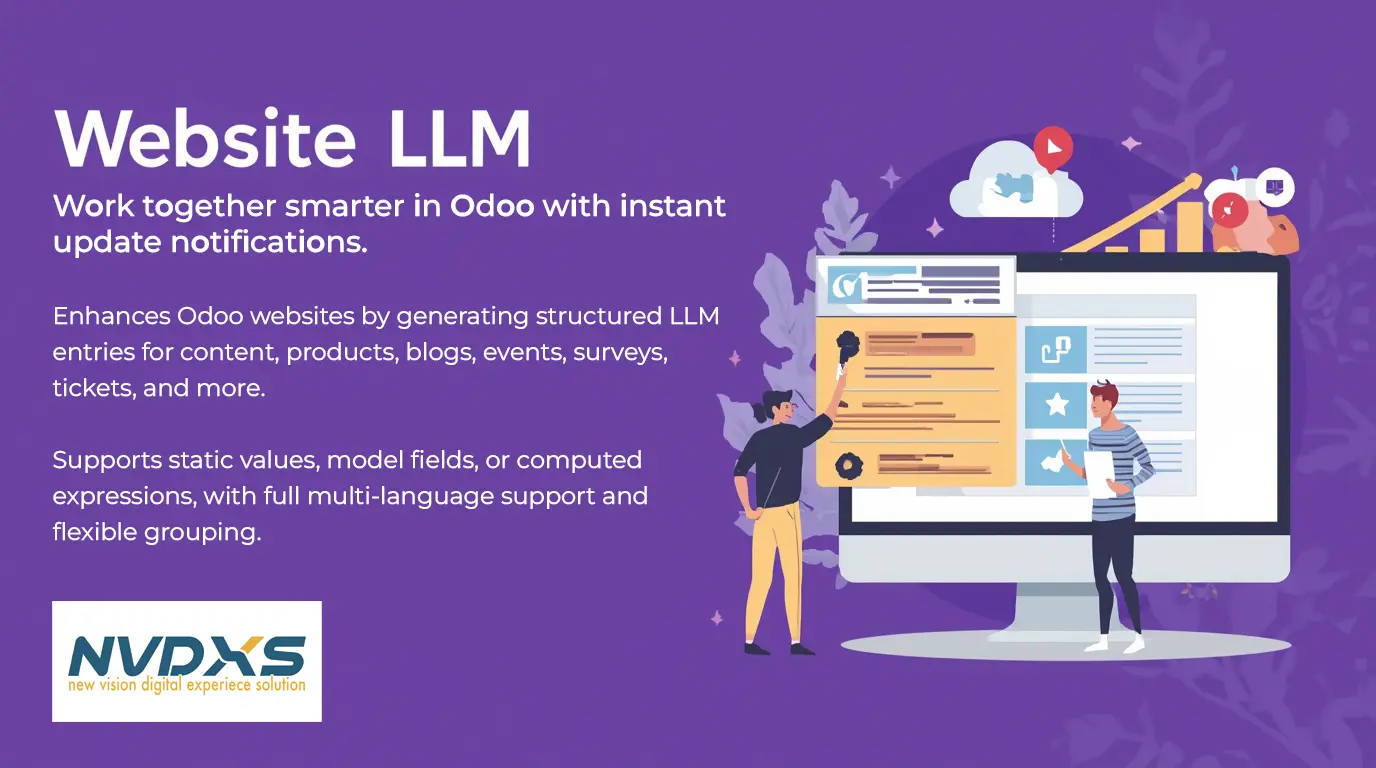
SEO Optimization
Control how missing pages respond for SEO: 404, 410, redirect to homepage, or redirect to custom URL
Dynamic Updates
Keep your LLM exports fresh—new or updated content on your site automatically syncs to llms.txt.
AI-Powered Optimization
Enhance descriptions with ChatGPT integration to generate polished, human-like, and SEO-friendly content at scale.
The Innovation Behind Our Product
Traditional SEO relies on sitemaps and meta tags, but modern search and AI systems are consuming content in new ways. Static optimization is no longer enough. Our product introduces a forward-looking approach: instead of relying solely on conventional SEO signals, Website LLM creates a dedicated llm.txt and llm-full.txt designed specifically for AI and large language models.
The innovation lies in bridging your Odoo content with how AI systems actually learn and index
- By generating structured, SEO-friendly entries, your website speaks directly to LLMs in their own preferred format.
- With both concise summaries (llms.txt) and detailed content (llm-full.txt), you provide layers of information that maximize visibility and relevance to AI and GEO .
- Through multi-language exports, all your existing Odoo translations are surfaced, ensuring your content is discoverable by AI across languages and regions.
The result: your website is no longer just optimized for search engines, it becomes AI-ready, future-proofing your digital presence and giving your business a unique competitive edge.


1. 🚀 Automatic LLM Entries
No more manual copy-pasting or worrying about formatting. Website LLM automatically generates entries for your products, blogs, events, and more, exporting them into llms.txt and llm-full.txt.
This means your site is instantly AI-ready, helping search engines and large language models (LLMs) index and understand your content with ease. The result: faster discovery, better visibility, and more traffic without extra effort.

2.📈 SEO Optimization That Works
Well-written content is not enough in today’s digital world—it must also be optimized for search. Website LLM fine-tunes your titles and descriptions for SEO and clarity, ensuring they are concise, keyword-rich, and highly relevant.
This small change has a big impact: better rankings in search engines, higher click-through rates, and ultimately, more qualified visitors landing on your website instead of your competitors’.

3. 🌍 Multi-Language Ready
Website LLM emits separate LLM entries for each language using the translations already stored on your Odoo records .
For every website language you support, the module writes language-specific lines into llm.txt and llm-full.txt based on the record’s translations. This ensures AI systems and LLMs see your content in the exact languages you maintain, improving relevance for multilingual indexing and AI consumption. In short: it surfaces your existing translations to AIs, not your website visitors.

4. 🔄 Dynamic Updates
Your website evolves every day with new products, services, or blog posts. Website LLM ensures that your AI and SEO files are always up to date—without any manual intervention.
By keeping your llms.txt and llm-full.txt automatically refreshed, you guarantee that search engines and AI models are working with the most current information. No stale content, no missed opportunities, only fresh SEO power.

5. 📂 Smart Grouping & Sections
our website evolves every day with new products, services, or blog posts. Website LLM ensures that your AI and SEO files are always up to date—without any manual intervention.
By keeping your llms.txt and llm-full.txt automatically refreshed, you guarantee that search engines and AI models are working with the most current information. No stale content, no missed opportunities, only fresh SEO power.

6. 🤖 AI-Powered Optimization
Why spend hours polishing text when AI can do it in seconds? Website LLM integrates with ChatGPT to optimize your metadata and long descriptions, creating professional, SEO-friendly copy that drives conversions.
From short snippets to detailed descriptions, you’ll get content that’s clear, engaging, and optimized for both search engines and LLMs. That means more traffic, more leads, and more time saved for your team.
Installation and configuration of "Website LLM" in Odoo
Requirements
- Odoo 18 is already installed and running.
- You have Admin rights in Odoo.
Step 1: Installing the Module
- Open the Odoo backend: Log in to your Odoo 18 backend.
- Open the Apps module: Click on "Apps" in the main menu.
- Use the search function: Enter "website_llm" in the search bar.
- Install the module: When the "Website LLM" module appears, click the "Install" button.
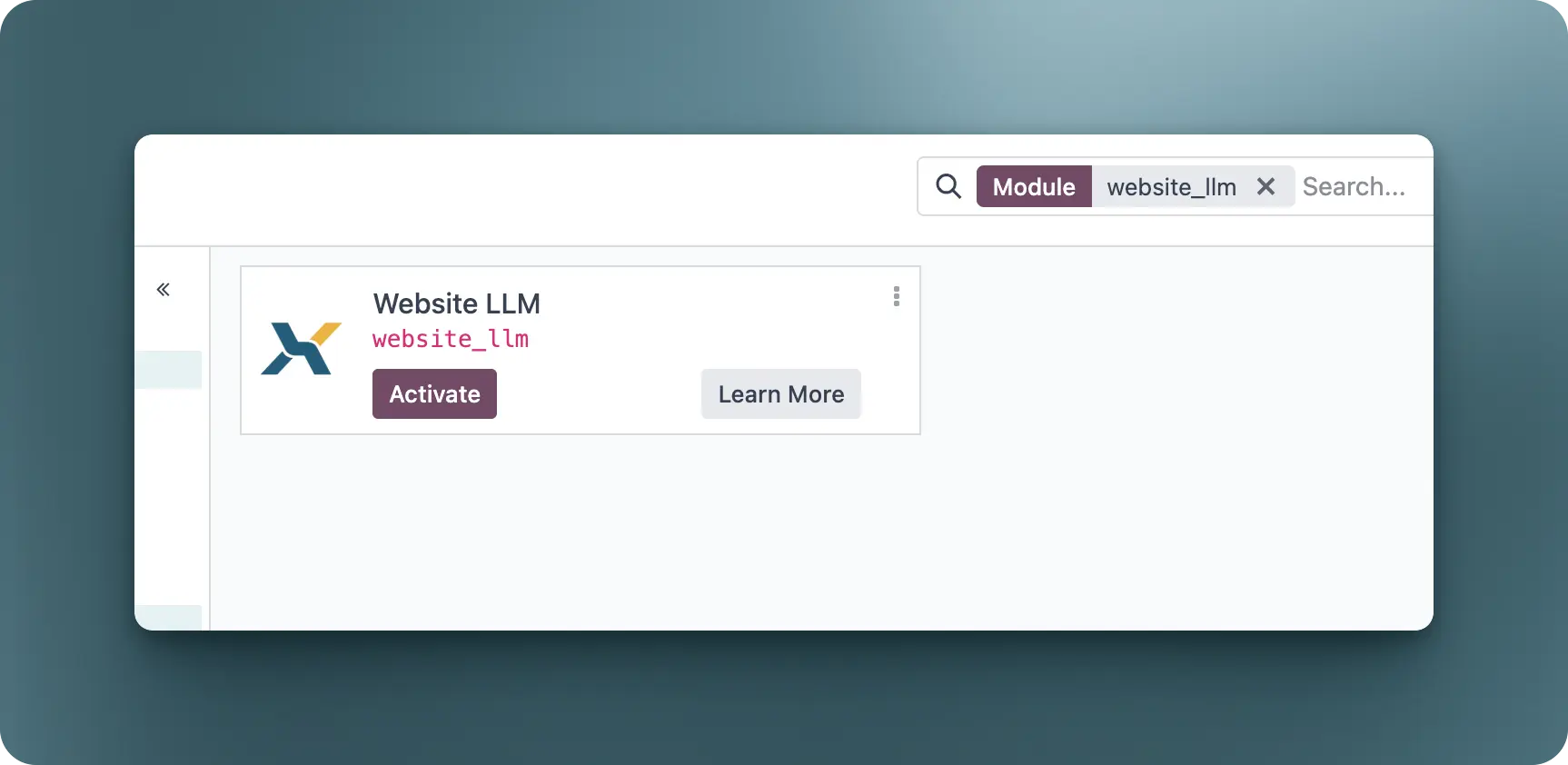
Step 2: Configuring the Module
General Settings:
Activate developer mode.
Navigate to: Website → Configuration → Websites.
Select the "llm.txt" tab:
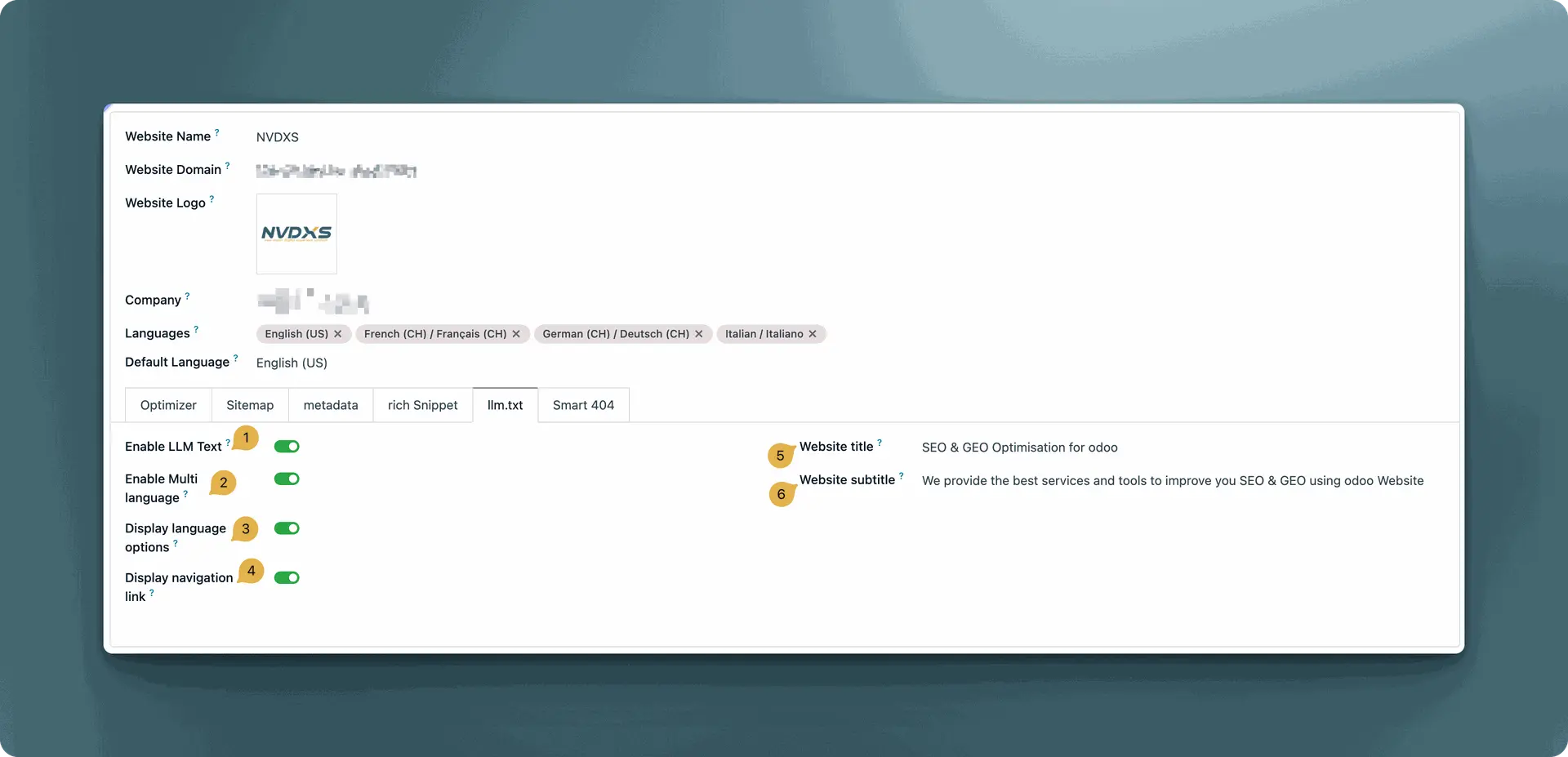
- Enable LLM TXT (enable_llm_txt)
Activate this option to generate llm.txt and llm-full.txt files for your website.
These files contain AI-optimized entries for better search and LLM visibility. - llm.txt — short, SEO-optimized entries for AI discovery.
- llm-full.txt — extended entries with detailed descriptions for AI training and enrichment.
- Enable Multi-language (llm_txt_multi_language)
- When enabled, the module will export all available translations of your content.
- Each record is included in multiple languages, based on your website’s configured translations.
- 💡 This option improves your visibility in multilingual AI systems and search engines
- Display Language Options (llm_txt_display_language_options)
- When activated, your llm.txt export will include a section listing available language codes (e.g., en, fr, de).
- This is especially useful for multilingual sites, helping AI models or crawlers understand your language structure.
- Display Navigation Links (llm_txt_display_navigation_link)
- When enabled, a “Navigation Links” section will be included at the bottom of the LLM export.
- This section automatically lists key pages such as:
- Homepage
- Shop
- Blog
- Contact
- It helps AI agents and automated crawlers better understand your website structure and link hierarchy.
- Website Title (llm_website_title)
- Set a custom title to appear at the top of your LLM export files.
- This can represent your brand or main site purpose (e.g., “Odoo Green – Sustainable Products Marketplace”).
- Website Subtitle (llm_website_subtitle)
- Add a subtitle or tagline that describes your website’s focus or industry.
- Example: “Discover eco-friendly solutions for modern businesses.”
- This helps contextualize your LLM data and adds a meaningful introduction for crawlers and AI systems.
Configure LLM Generation Models:
Navigate to: Website → Site → Geo.
Select the "GEO LLM Config" menu:
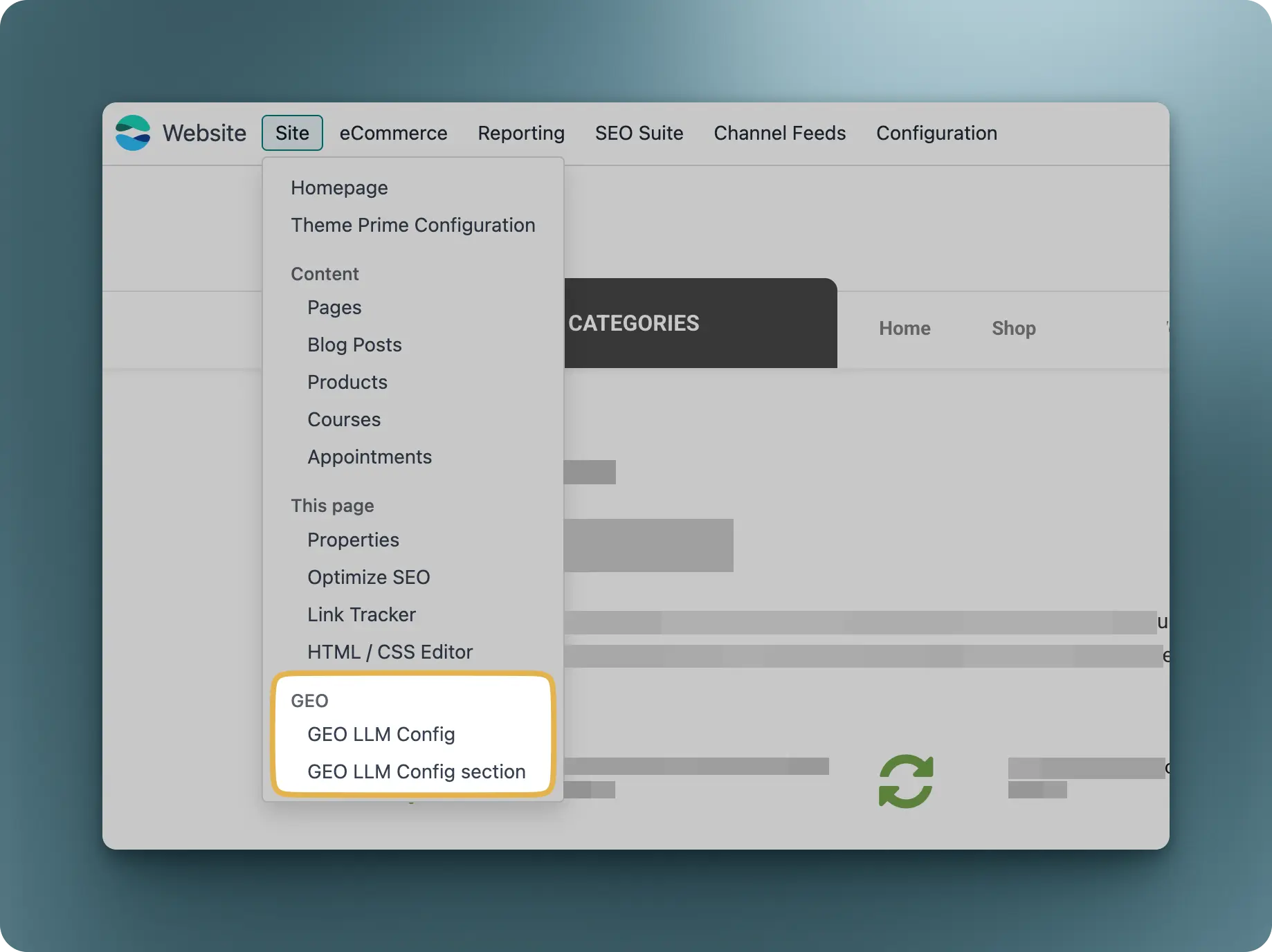
This section defines what kind of content your website includes in the exported llm.txt and llm-full.txt files.
Each configuration controls one model (e.g., Products, Blog Posts, Events, etc.) and defines how titles, URLs, and descriptions are generated.
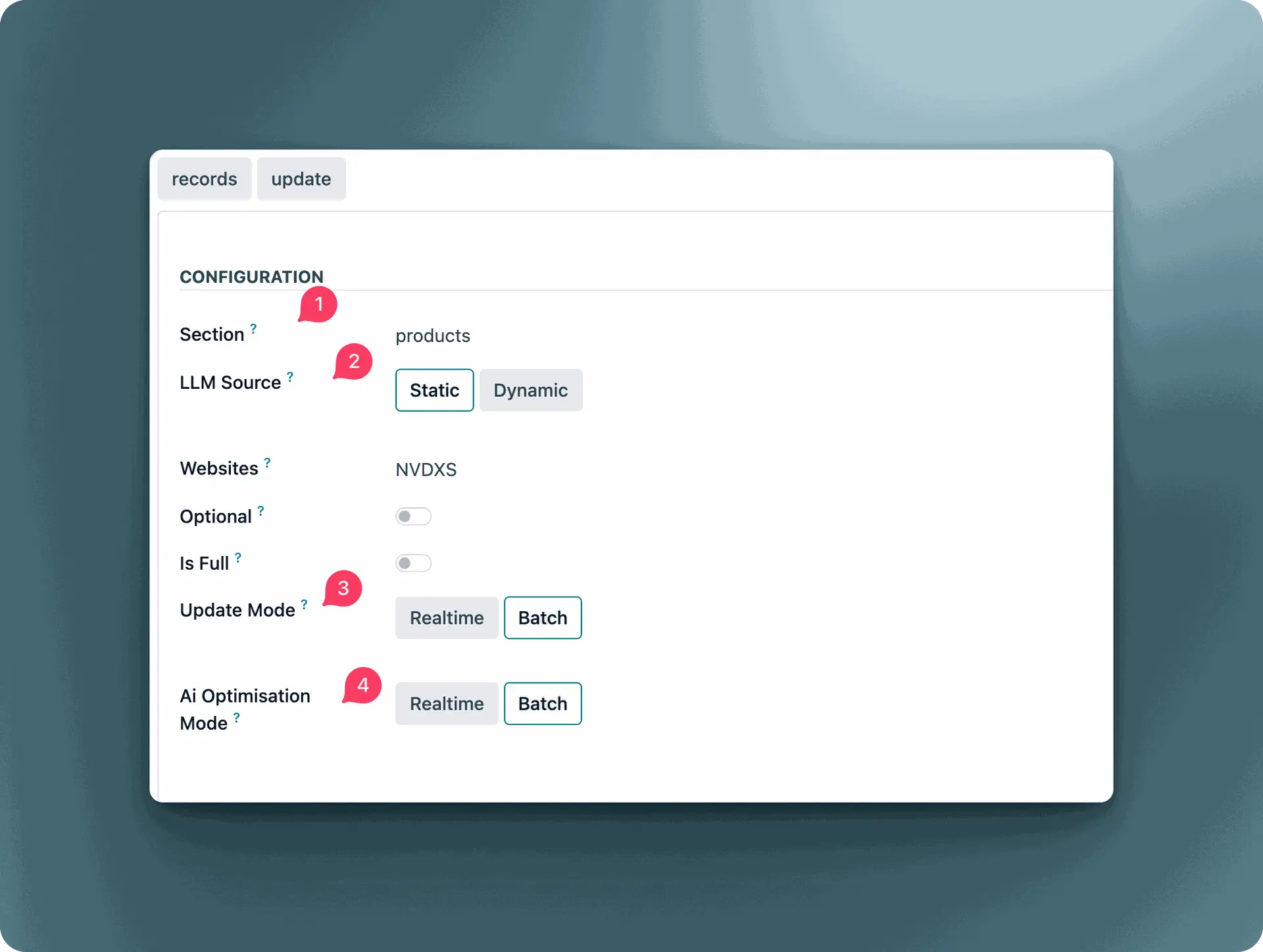
1. Section
Each LLM configuration belongs to a Section (for example: “Products”, “Blog”, “Services”).
Sections help organize entries visually inside llm.txt and llm-full.txt with proper headings.
You can create sections under:
Website → Configuration → LLM → LLM Sections
2. LLM Source Type
You can choose between:
- Static: manually entered text (e.g., one fixed description across all pages).
- Dynamic: values pulled from model fields or computed with Python expressions.
This choice determines how flexible your LLM entries are.
If You Choose “Static”
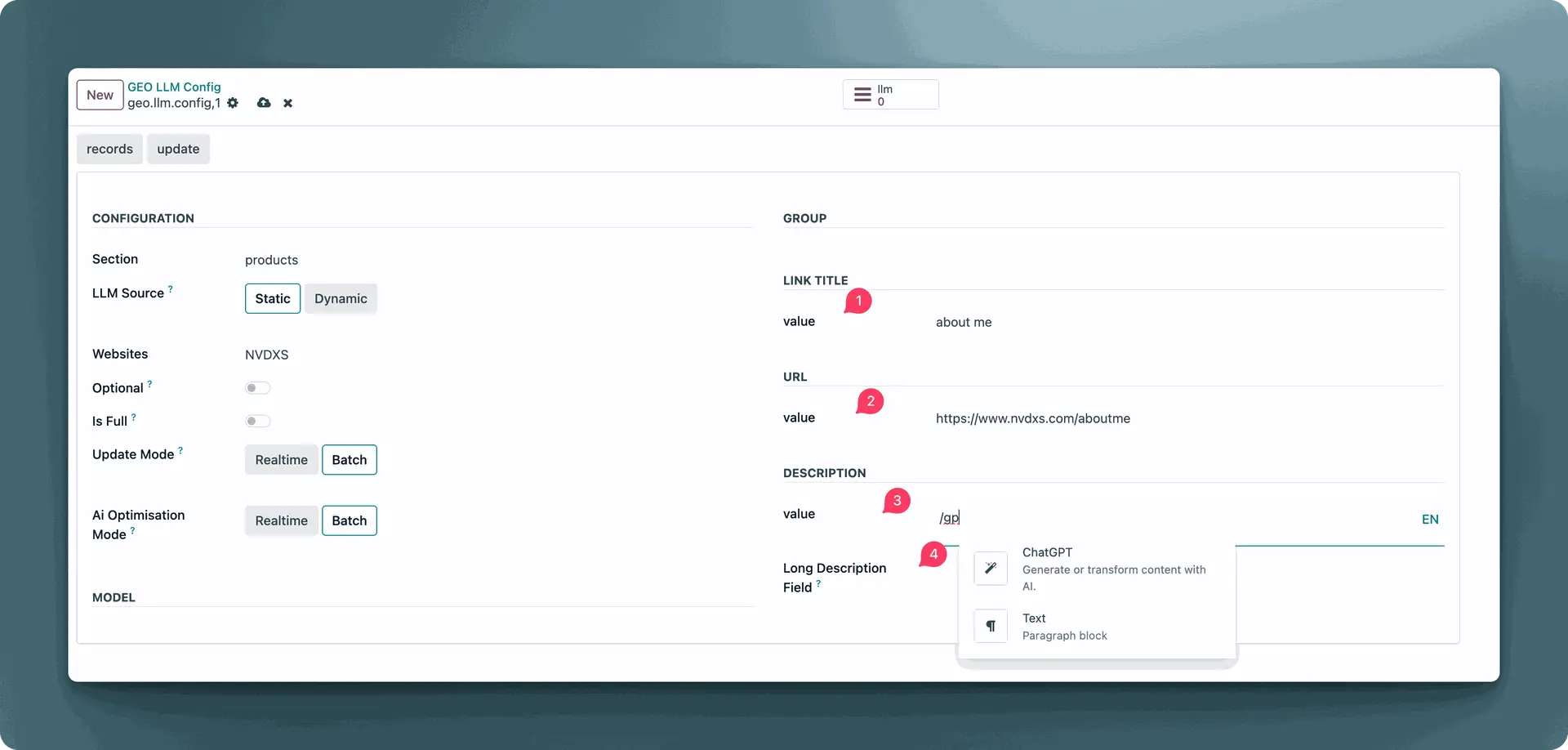
In static mode, your LLM configuration represents one single entry for example, an “About Us” or “Privacy Policy” page.
You can fill the following fields directly:
- Link Title Value: the visible name (e.g., “About Our Company”)
- URL Value: the full URL or path (e.g., /about-us)
- Description Value: a short SEO description
- Long Description Field: optional detailed text for llm-full.txt
You can the build-in chat-gpt feature of odoo to create or adapt your text
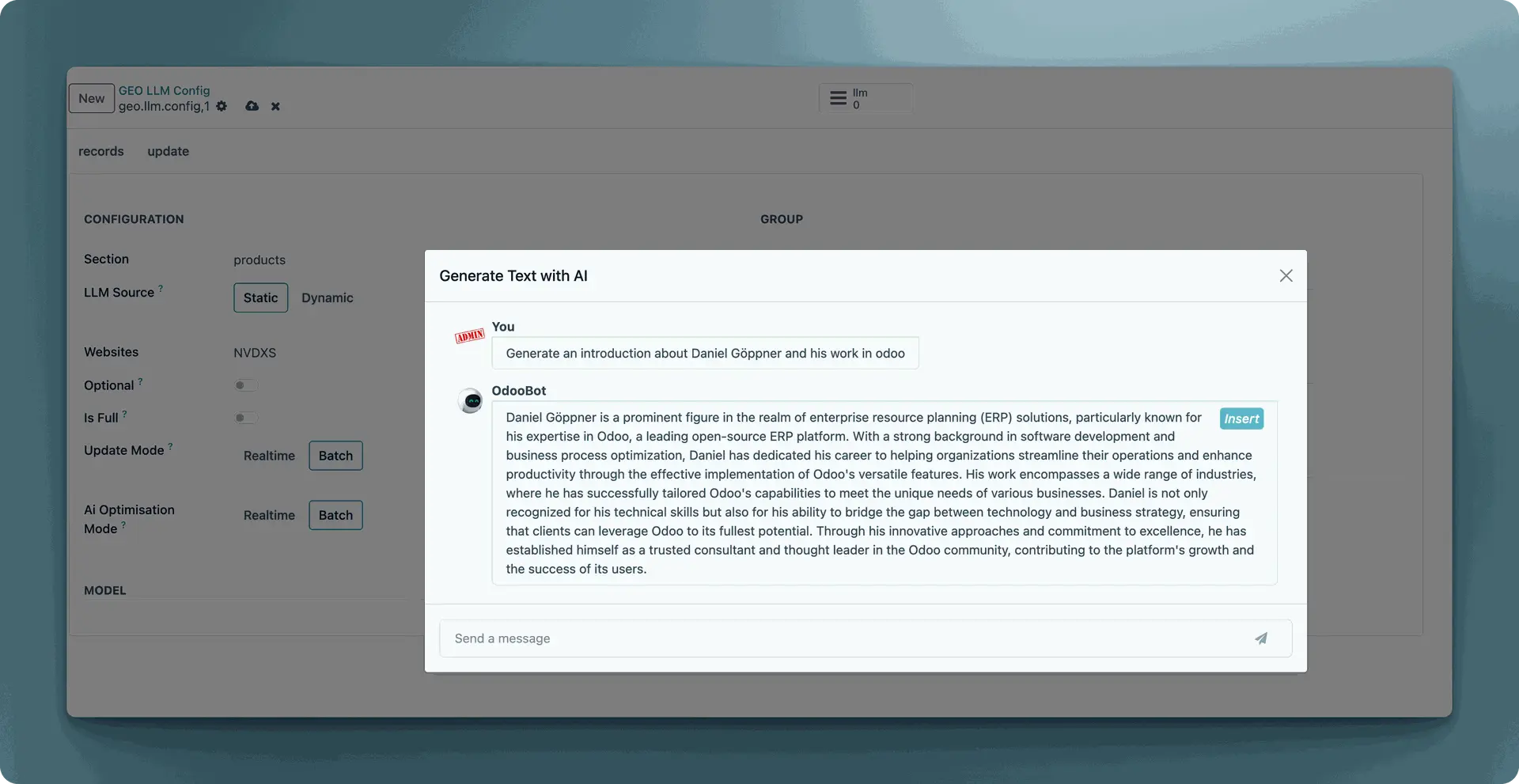
If You Choose “Dynamic”
In dynamic mode, the module automatically creates one entry per record from the selected Odoo model.
For example, if your model is product.template, one LLM entry will be generated per product that matches the defined Domain.
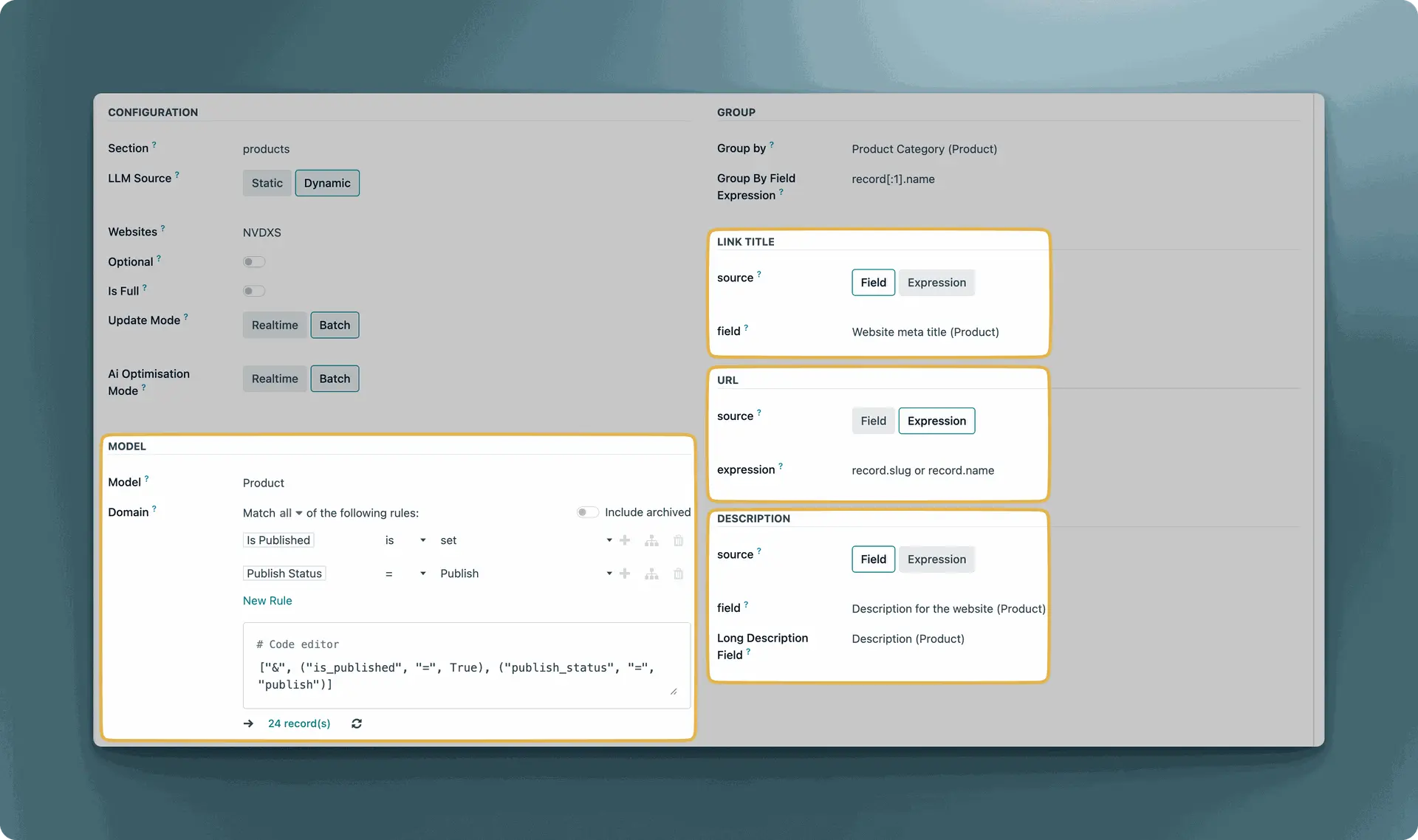
Model: Select the model you want to export (e.g., product.template, blog.post).
Domain: Optionally restrict which records are included.
Example: [('is_published', '=', True)] — exports only published records.
Link Source: How to generate the title for each entry:
- Field: choose an existing field like name
- Expression: define a computed value like record.name + ' | ' + record.categ_id.name
URL Source: How to generate the URL:
- Field: use an existing URL-like field
- Expression: compute it dynamically, e.g., record.slug or record.website_url
Description Source: How to generate the short description:
- Field: use a text field like description_sale
- Expression: compute a custom description dynamically
Long Description Field: Select a text or HTML field to include in llm-full.txt, such as description or website_description.
3. Update Mode
Choose how your entries are updated:
- Realtime: updates immediately whenever a related record changes (more accurate but may impact performance).
- Batch: updates periodically via a scheduled cron job (recommended for large datasets).
💡 Tip: Use “Batch” for high-volume models like product.template and “Realtime” for small or frequently edited models like blog.post.
4. AI Optimization Mode
Define how often your entries are enhanced using AI (ChatGPT integration):
- Realtime: AI rewrites titles/descriptions as soon as they’re generated.
- Batch: optimization is done during nightly cron runs for better performance.
5. Grouping
You can group related entries in your LLM exports by category or tag using Group By Field.
Example: group products by category (categ_id) or blog posts by author.
Optionally, you can define a Group Expression to customize how the group name appears (e.g., record.categ_id.complete_name).
6. Website
Assign the configuration to a specific website (multi-website compatible).
Each website can have its own LLM structure and sections.
7. AI Optimization
You can optimize your generated titles and descriptions using the built-in ChatGPT connector.
From any LLM record or configuration, click “Optimize with AI” to automatically refine entries for SEO and clarity.
8. Optional
The Optional checkbox marks a configuration as non-essential.
Optional sections are grouped under ## Other Pages in your llm.txt export.
This is useful for smaller or miscellaneous entries that don’t belong to a main content section (like “Legal”, “Cookies”, etc.).
9. Is Full
The Is Full option includes this configuration’s data in llm-full.txt, not just llm.txt.
- ✅ Enabled: Exports long-form or detailed content (e.g., full product descriptions, blog text).
- ❌ Disabled: Exports only titles, short descriptions, and URLs to the main llm.txt.
This allows you to separate your concise list (for quick AI indexing) from your detailed dataset (for training or full content generation).
Example:
llm.txt → short snippets for AI understanding and SEO.
llm-full.txt → detailed structured data for AI fine-tuning or full-site LLM ingestion.
10. Updating Entries
After saving your configuration:
- Click “Update LLM Entries” to generate or refresh data.
- You can view generated entries under Website → Configuration → LLM → LLM Entries.
⚙️ Batch configurations update automatically via the scheduled cron job (_cron_update_llm).
Accessing LLM Entries
To manage generated entries:
Select your llm config and access the generated records from the smart button
Here, you’ll see all the entries that were automatically generated from your LLM Configurations.
Each entry corresponds to one exported record — for example, a product, blog post, or static page.
Understanding the LLM Entry Fields
Each record in geo.llm contains structured data used for both SEO and AI optimization.
| Field | Description |
| Section | The content section the entry belongs to (inherited from its configuration). |
| Configuration | The geo.llm.config that generated this entry. |
| Model / Record ID | Identifies the source record (e.g., a product or page). |
| Title | The base title extracted or computed from your data. |
| Title (Optimized) | The AI-enhanced version, rewritten for clarity and SEO. |
| URL | The full public URL, computed using your website’s domain and language. |
| Description | A concise description for indexing and understanding content. |
| Description (Optimized) | AI-improved description for better context and keyword density. |
| Long Description | Full or extended text content, suitable for LLM ingestion (used in llm-full.txt). |
| Long Description (Optimized) | The AI-refined version of your long description. |
| Group Value | Logical grouping value (e.g., category name). |
| Website | Website context for which this entry is generated. |
| AI Optimization Message | Displays the last optimization result or error. |
| AI Optimized | Boolean showing if AI enhancement was successfully applied. |
How Entries Are Generated
Entries are automatically created or updated whenever:
- You save or update a configuration (in geo.llm.config),
- The cron job _cron_update_llm runs (batch mode),
- you save or create a new record from a model selected in geo.llm.config, where the update mode is realtime
- You manually trigger “Update LLM Entries” from a configuration.
Depending on your configuration:
- Static Entries: Created from manually defined fields (no linked model).
Example: “About Us”, “Contact Page”. - Dynamic Entries: Created from model records and updated based on expressions or fields.
Example: Products, Blogs, Events, or Articles.
Multilingual Support
Each LLM entry is automatically generated for all active website languages.
The system cycles through every enabled language and creates localized titles, descriptions, and URLs.
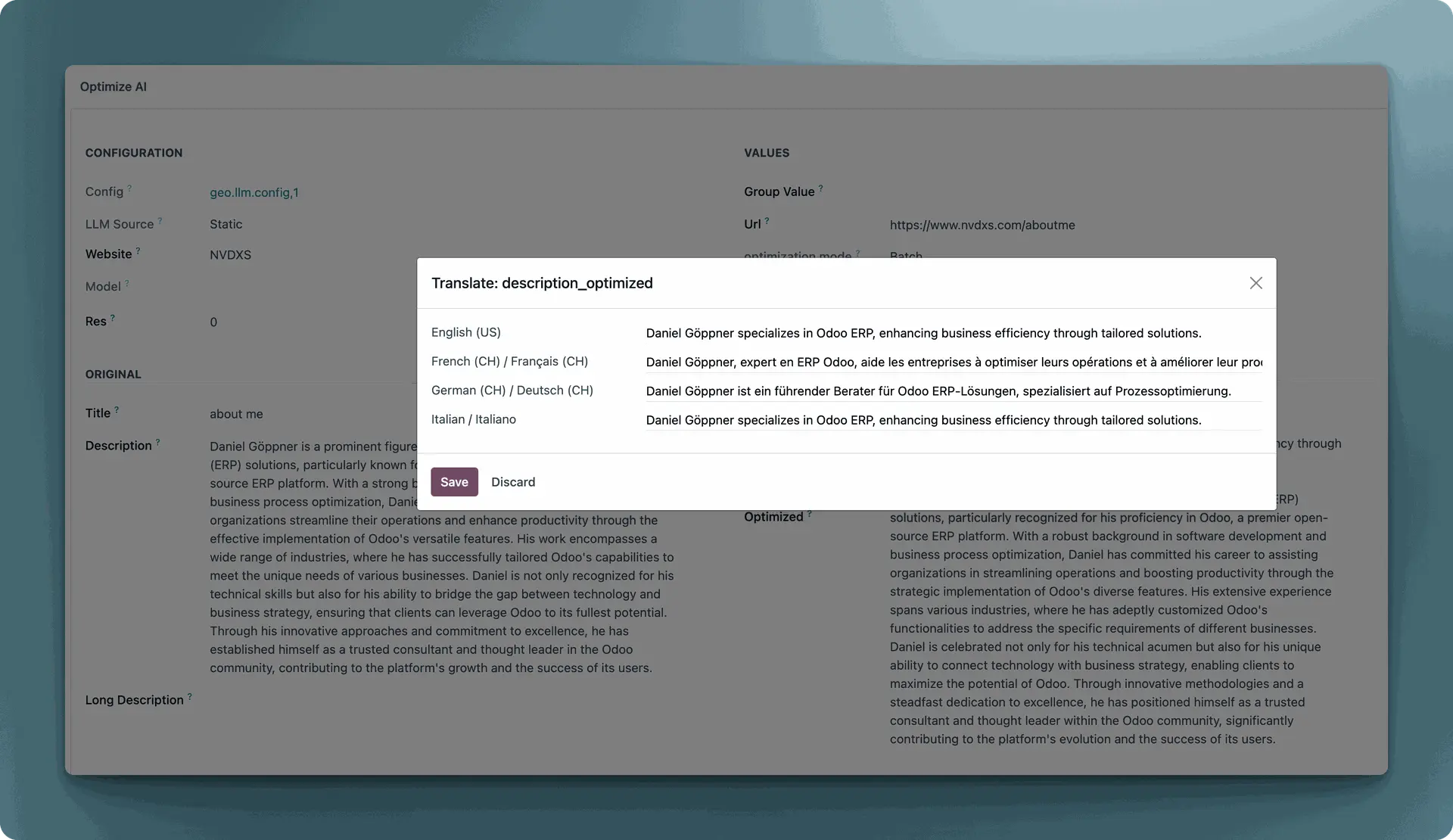
💡 Tip:
Enable “Display Language Options” in your Website Settings → LLM TXT tab
to let visitors and AI tools switch between localized content exports.
AI Optimization (Realtime & Batch)
The AI Optimization system enhances your generated content for SEO and LLM readability.
You can control when this happens:
- Realtime: The optimization runs instantly when a new entry is generated.
- Batch (Cron): Optimizations are executed periodically for all pending entries.
Each optimization call uses your configured AI endpoint (via website._OLG_api_rpc) and processes:
- Titles (short and keyword-rich)
- Descriptions (clear and SEO-friendly)
- Long Descriptions (detailed, human-like summaries)
Results are stored in title_optimized, description_optimized, and long_description_optimized.
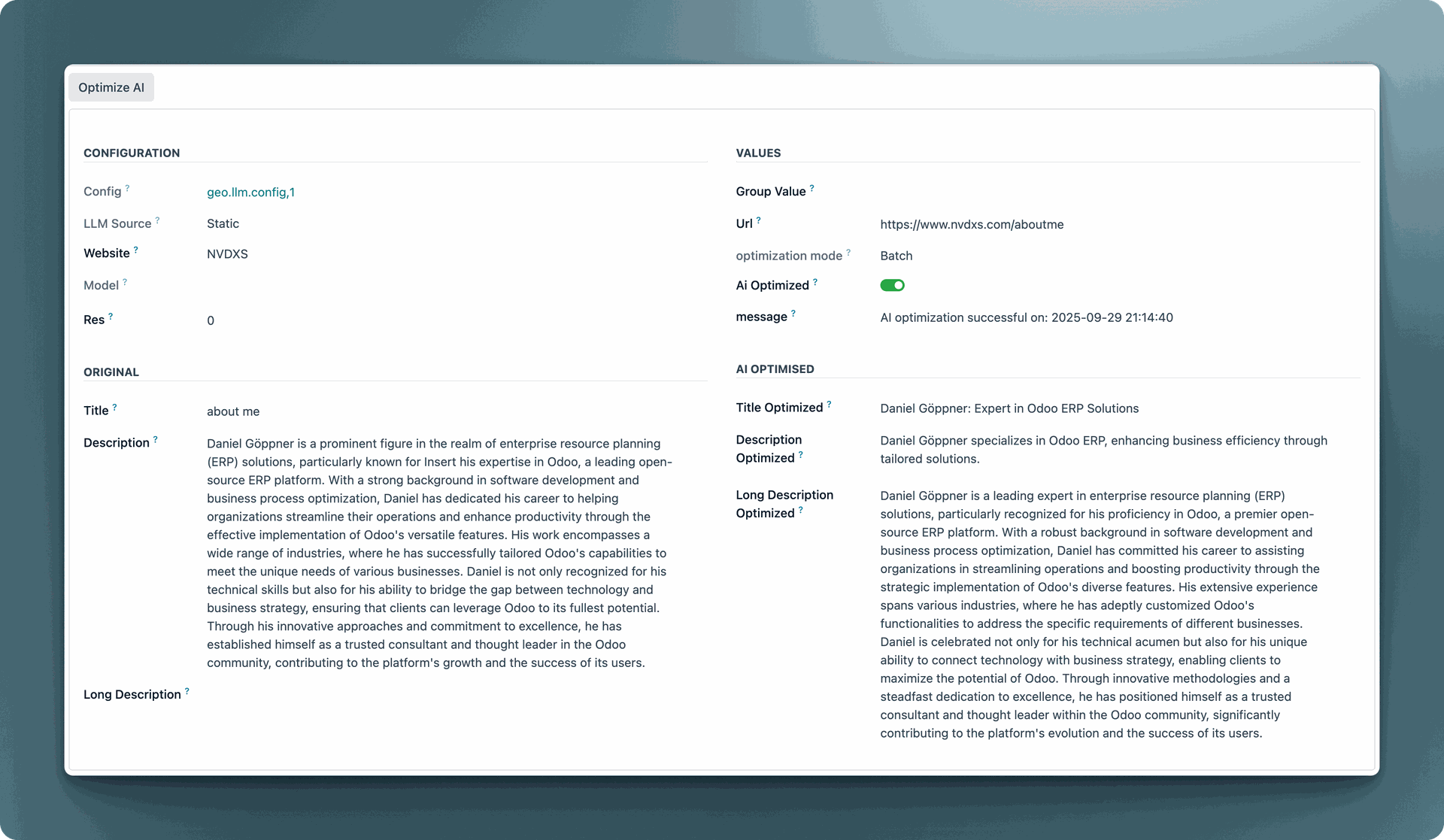
Manual Optimization
To manually optimize an entry:
- Go to you llm config
- Open any record from the smart button
- Click “Optimize with AI”
The system will:
- Send your entry data to the AI model
- Update the optimized fields
- Record a timestamp and message confirming success
✅ After optimization, the record shows “AI Optimized = True”
Maintenance and Cleanup
You can manage the data lifecycle easily:
- Delete entries for a model:
Automatically handled when a model or configuration is changed or deleted.
You can also manually clear entries using the internal method _clear(model). - Rebuild all entries:
Run “Update LLM Entries” from the configuration or trigger the cron job. - Re-optimize all entries:
Use the scheduled cron _cron_optimize_llm or manually trigger AI optimization.
Export and Usage
The generated data feeds directly into your exported text files:
- llm.txt → short structured entries for fast AI ingestion or search indexing.
- llm-full.txt → full-length, descriptive entries for deep model understanding.
Each export groups entries by:
- Website
- Section
- Configuration sequence
- Group values (if set)
Optional configurations are included under ## Other Pages, while entries with “Is Full” are additionally written into the full export.
View and Verify the Generated Files
Once everything is configured, the system automatically generates your AI-readable export files.
You can access them directly from your browser:
- 🌐 LLM Sitemap:
This file contains short summaries and links grouped by section and language.https://yourdomain.com/llms.txt
- 📘 Full LLM Sitemap:
This includes expanded, long-form descriptions for deeper AI ingestion or SEO indexing.https://yourdomain.com/llms-full.txt
💡 Tip:
Both files are updated automatically when LLM entries are created or optimized.
You can open them anytime to verify that your website content is correctly exported and properly formatted.
Frequently Asked Questions (FAQ) – Website Smart 404
A: No. This Odoo application is not designed for use with Odoo Online (SaaS). It works only on self-hosted Odoo instances.
A: The GEO LLM module automatically generates and maintains AI-optimized multilingual content (titles, descriptions, and URLs) for your Odoo website. It transforms every product, page, or record into SEO-ready data that search engines and AI models can easily read.
Instead of manually writing metadata for hundreds of items, the module does it for you — continuously improving it through AI optimization.
A: Search engines and AI systems increasingly rely on structured, optimized, and multilingual text data to understand your website.
With GEO LLM, every piece of your site becomes AI-friendly and search-friendly. It ensures your content is visible to Google, ChatGPT, and other AI systems — boosting your traffic, visibility, and conversions without manual SEO work.
A: Each entry (product, blog, page, etc.) is analyzed and enhanced using an AI-driven optimization engine.
The system sends structured prompts to refine your titles, descriptions, and long descriptions for clarity, tone, and SEO performance — all while staying native to each language.
You can trigger this manually or let it run automatically through scheduled cron jobs, keeping your site permanently optimized.
A: Yes — and that’s one of its biggest advantages.
The module automatically exports and maintains all entries in every active website language, ensuring your site stays multilingual at scale.
Even better: it can display language options and navigation links dynamically, improving both accessibility and user experience for international visitors.
A: Not at all.
You simply define what you want optimized in the GEO LLM Config — choose your model (e.g., Product, Blog, Event), set how URLs and descriptions are built (static, field, or expression), and the system handles the rest.
Thanks to the dynamic expression support, you can easily generate complex URLs or text logic without touching Python code.
A: Manually writing multilingual SEO metadata is tedious and costly. GEO LLM automates it end-to-end — generation, translation, AI optimization, and publishing.
That means:
- No need for large SEO or localization teams
- Instant SEO improvements with minimal setup
- Continuous content freshness through AI
- Consistent branding across all languages
In short: GEO LLM turns content management into a fully automated growth engine for your Odoo website.
| odoo version | 18.0 |



